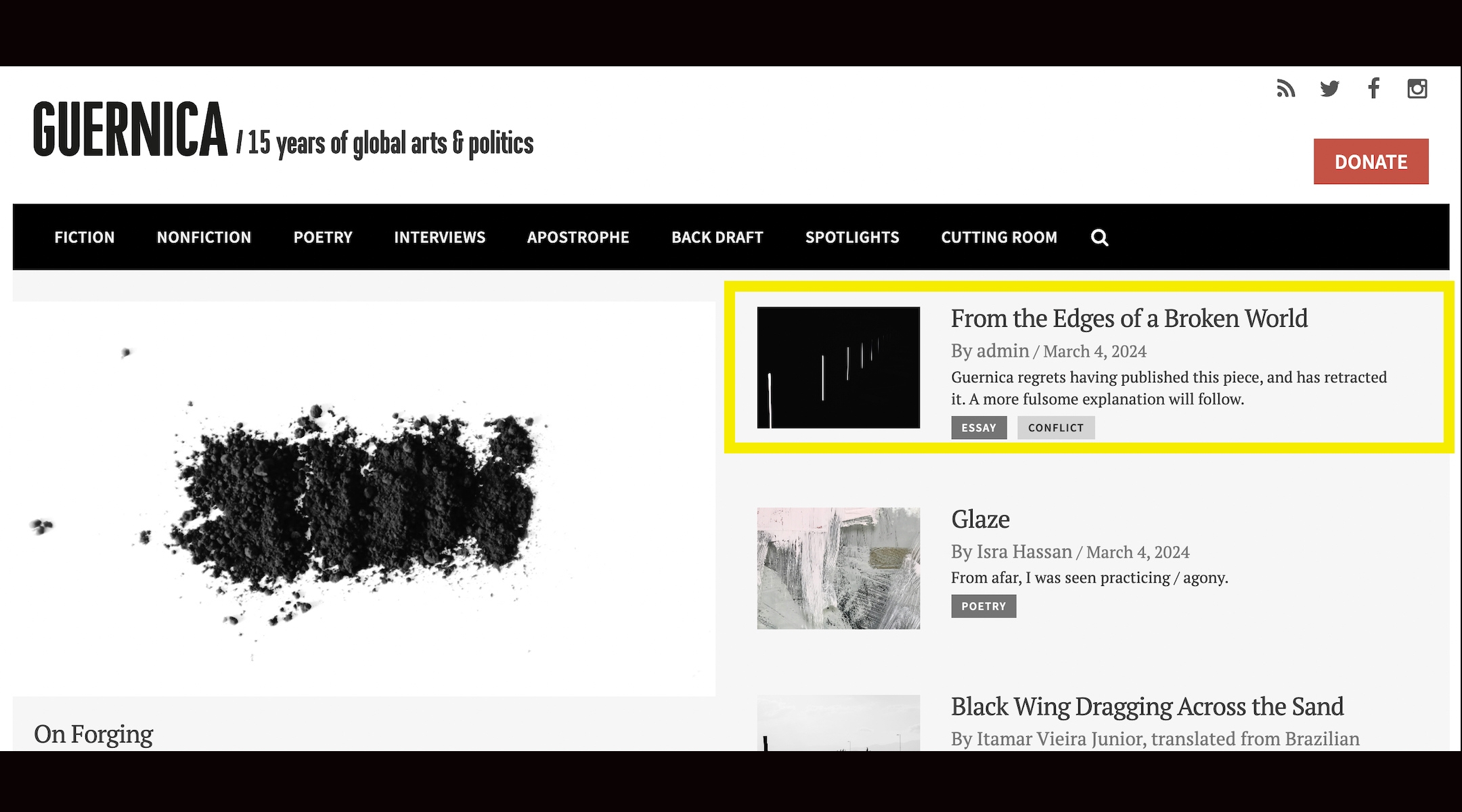Guernica editor who published Israeli writer’s coexistence essay resigns, saying she disagreed with retraction
“The magazine stands by its retraction of the work; I do not,” Jina Moore wrote in a blog post a month after Joanna Chen’s essay first appeared

The website of Guernica, a literary magazine, shows the retracted essay by Israeli translator Joanna Chen. (Screenshot)
(JTA) – The editor-in-chief of the prestigious literary magazine Guernica whose decision to publish an Israeli writer’s essay about the war in Gaza last month led to the mass resignation of the magazine’s staff has herself resigned from the publication, saying she disagreed with the decision to retract the essay.
Jina Moore announced her resignation in a blog post on Friday, nearly a month after Guernica retracted the essay by the British-Israeli writer and translator Joanna Chen.
“The magazine stands by its retraction of the work; I do not,” Moore wrote in the post.
On the social network X, Moore issued a more pointed critique of the Guernica staffers who objected to Chen’s piece. “After weeks of difficult conversation, it is clear to me that Guernica’s space for writing on war, injustice, and oppression has evolved away from commitments I consider essential,” she wrote.
Chen’s essay, “From the Edges of a Broken World,” ignited a firestorm at the heart of the literary world’s deeply polarized reaction to the war. After the piece was published in early March, Guernica’s co-publisher called it an “apologia for Zionism and the ongoing genocide in Palestine,” and more than 15 members of the all-volunteer staff resigned in protest. The journal also removed Chen’s essay, appending a note online promising “a more fulsome explanation” for the decision, though none has appeared to date.
For some Jews who have questioned their place in progressive and literary spaces since Hamas’ Oct. 7 attack on Israel, Guernica’s retraction offered new evidence of a toxic discourse in which no Israeli or Jew can pass muster. “The problem, when it really comes down to it, is that it presents an Israeli as human,” the Jewish writer Emily Fox Kaplan tweeted at the time.
Moore said she disagreed with the criticism of the essay.
“Many critics have said the essay normalized the violence Israel has unleashed in Gaza. I disagree,” Moore wrote in her Friday post. “I saw the piece as an example of the difficult work that Guernica is known for: capturing, with complexity and nuance, how such violence is normalized, and how a violent state extracts complicity from its citizens.”
Moore had served as Guernica’s top editor for three years and its co-publisher since 2003. A former East Africa bureau chief for The New York Times who has worked to support journalists in the aftermath of violence, Moore is managing editor of the Harvard Public Health Magazine. Moore was a Truman Scholar at Boston University, where she led a Holocaust education club, studied with Elie Wiesel and conducted research into the Holocaust. “I want to address genocide — why it happens, and what it means for those of us living secure lives as it occurs,” she told the university newspaper as an undergraduate in 2001.
Moore previously spearheaded a women’s rights reporting initiative at Buzzfeed. In her Guernica resignation announcement, she wrote, “A personal essay by a woman writer about the political nature of caregiving also struck me as aligned with a long tradition of feminist writing in Guernica’s pages.” In the essay, Chen, a peace activist who volunteers as a medical transport driver for Palestinians, describes her conflicted emotions after Oct.7.
Moore’s resignation was itself pilloried by some progressive writers. “There was nothing feminist about that essay,” Palestinian-American novelist Susan Muaddi Darraj wrote on X. “I am shocked by people who cannot see how harmful it was.”
“Good riddance!” added anti-Zionist Jewish writer Joshua Gutterman Trannen.
After being retracted, Chen’s piece was later re-published by The Washington Monthly, a center-left publication.
This article originally appeared on JTA.org.



















